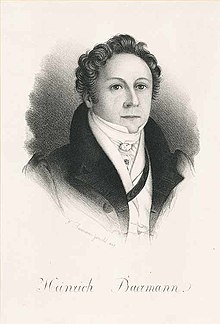Heinrich Joseph Baermann
Heinrich Joseph Baermann (born February 14, 1784 in Potsdam , † June 11, 1847 in Munich ) was a German clarinetist .
Life
Baermann was the son of a Prussian military musician, his brother Carl also pursued this career. He received his first clarinet lessons from 1797 to 1804 in the military music school in Potsdam from the clarinetist Joseph Beer , who at that time was employed as a royal Prussian chamber musician.
In 1804 Prince Louis Ferdinand became aware of the twenty-year-old Baermann and finally called him to Berlin , where he was tutored by the royal court musician Franz Tausch (1762-1817).
In 1806 Napoleon's declaration of war on Prussia and Russia interrupted his stay in Berlin; Baermann took part in the fighting as a military musician and became a prisoner of war, from which he was able to free himself. He returned to Berlin, which was occupied by the French, but could not find a job. He went to Munich with a letter of recommendation from the Bavarian Crown Prince, and after his first participation in the wedding celebrations of the eldest daughter of the royal family, King Maximilian I offered him the position of first clarinetist in the court orchestra.
Heinrich Joseph Baermann was at the head of the Royal Bavarian clarinetists until 1834 . Admired and revered, he was able to increase and consolidate his reputation primarily through numerous concert tours throughout Europe. His technical brilliance and his sense of art also helped him to achieve international fame. The requirement that the clarinetist must sing on his instrument, repeatedly made in the textbooks, was met by Baermann in the best possible way.
The encounter and friendship with Carl Maria von Weber and later with Felix Mendelssohn became for the artists at a time of mutual creativity and inspiration. Without the acquaintance of Baermann, Weber would probably not have had the idea of creating such a rich work for the clarinet. Mendelssohn wrote the concert piece for clarinet, basset horn and piano for Heinrich and his son Carl on December 30, 1832 in Berlin .
As a teacher, he had a lasting effect on the high qualification of the next generation of clarinetists. His son Carl Baermann became his most famous student and partner on his concert tours. Carl Baermann's mother was the opera singer Helene Harlaß (1785–1818).
Fulfilling the expectations of an instrumentalist of his time, Baermann published numerous clarinet compositions, one of which was initially incorrectly attributed to the young Richard Wagner , an adagio for clarinet .
Heinrich Joseph Baermann died in June 1847 and was buried in the Old Southern Cemetery with great sympathy from the Munich population .
literature
- Rochus von Liliencron: Baermann, Heinrich Jos. In: Allgemeine Deutsche Biographie (ADB). Volume 2, Duncker & Humblot, Leipzig 1875, p. 69 f.
- Heinz Becker: Baermann, Heinrich Josef. In: New German Biography (NDB). Volume 1, Duncker & Humblot, Berlin 1953, ISBN 3-428-00182-6 , p. 526 f. ( Digitized version ).
- Kieseheuer, Frank: Heinrich Joseph Baermann and the composers, thesis, University of Music Detmold, 2002
Web links
- Sheet music and audio files by Heinrich Joseph Baermann in the International Music Score Library Project
- Heinrich Joseph Baermann in the Carl Maria von Weber Complete Edition
Individual evidence
- ↑ on Helene Harlas see Karl-Josef Kutsch , Leo Riemens : Großes Sängerlexikon . Fourth, expanded and updated edition, Munich 2003, ISBN 3-598-11598-9 , pp. 10206f.
| personal data | |
|---|---|
| SURNAME | Baermann, Heinrich Joseph |
| BRIEF DESCRIPTION | German clarinetist |
| DATE OF BIRTH | February 14, 1784 |
| PLACE OF BIRTH | Potsdam |
| DATE OF DEATH | June 11, 1847 |
| Place of death | Munich |
